A plus
A plus guarantee
- 108
- 0
- 3
Community
- Followers
- Following
112 items
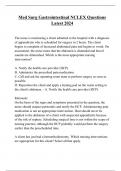
Medicine & Surgery Gastrointestinal NCLEX Questions Latest 2024
Med Surg Gastrointestinal NCLEX Questions Latest 2024 The nurse is monitoring a client admitted to the hospital with a diagnosis of appendicitis who is scheduled for surgery in 2 hours. The client begins to complain of increased abdominal pain and begins to vomit. On assessment, the nurse notes that the abdomen is distended and bowel sounds are diminished. Which is the most appropriate nursing intervention? A. Notify the health care provider (HCP). B. Administer the prescribed pain medica...
- Exam (elaborations)
- • 57 pages •
Med Surg Gastrointestinal NCLEX Questions Latest 2024 The nurse is monitoring a client admitted to the hospital with a diagnosis of appendicitis who is scheduled for surgery in 2 hours. The client begins to complain of increased abdominal pain and begins to vomit. On assessment, the nurse notes that the abdomen is distended and bowel sounds are diminished. Which is the most appropriate nursing intervention? A. Notify the health care provider (HCP). B. Administer the prescribed pain medica...
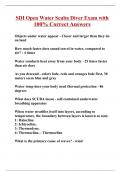
SDI Open Water Scuba Diver Exam with 100% Correct Answers 2024
SDI Open Water Scuba Diver Exam with 100% Correct Answers Objects under water appear - Closer and larger than they do on land How much faster does sound travel in water, compared to air? - 4 times Water conducts heat away from your body - 25 times faster than air does As you descend - colors fade, reds and oranges fade first, 30 meters seem blue and gray Water temp does your body need thermal protection - 86 degrees What does SCUBA mean - self-contained underwater breathing app...
- Exam (elaborations)
- • 10 pages •
SDI Open Water Scuba Diver Exam with 100% Correct Answers Objects under water appear - Closer and larger than they do on land How much faster does sound travel in water, compared to air? - 4 times Water conducts heat away from your body - 25 times faster than air does As you descend - colors fade, reds and oranges fade first, 30 meters seem blue and gray Water temp does your body need thermal protection - 86 degrees What does SCUBA mean - self-contained underwater breathing app...
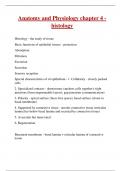
Anatomy & Physiology
It includes fully Composed notes from Chapter 1 to Chapter 4 and Guidelines Questions for Revision Purposes
- Package deal
- • 5 items •
- Ch. 1 Introduction to Anatomy and Physiology fully composed • Summary
- Chapter 2 - The Chemistry of Life(Anatomy) • Summary
- Chapter 2: The chemistry of life Study Guide Questions 2023/2024 • Exam (elaborations)
- Chapter 3 (The Cell)-Human Anatomy • Summary
- Anatomy and Physiology chapter 4 - histology • Summary
It includes fully Composed notes from Chapter 1 to Chapter 4 and Guidelines Questions for Revision Purposes

Anatomy and Physiology chapter 4 - histology
Anatomy and Physiology chapter 4 - histology Histology - the study of tissue Basic functions of epithelial tissues - protection Absorption Filtration Excretion Secretion Sensory reception Special characteristics of of epithelium - 1. Cellularity - closely packed cells 2. Specialized contacts - demosomes (anchors cells together); tight junctions (form impermeable layers); gap junctions (communication) 3. Polarity - apical surface (faces free space); basal surface (closer to basal memb...
- Package deal
- Summary
- • 13 pages •
Anatomy and Physiology chapter 4 - histology Histology - the study of tissue Basic functions of epithelial tissues - protection Absorption Filtration Excretion Secretion Sensory reception Special characteristics of of epithelium - 1. Cellularity - closely packed cells 2. Specialized contacts - demosomes (anchors cells together); tight junctions (form impermeable layers); gap junctions (communication) 3. Polarity - apical surface (faces free space); basal surface (closer to basal memb...
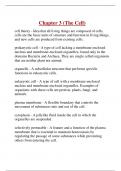
Chapter 3 (The Cell)-Human Anatomy
Chapter 3 (The Cell) Cell theory - Idea that all living things are composed of cells, cells are the basic units of structure and function in living things, and new cells are produced from existing cells. Prokaryotic cell - A type of cell lacking a membrane-enclosed nucleus and membrane-enclosed organelles; found only in the domains Bacteria and Archaea. They are single celled organisms that are neither plant nor animal. Organelle - A subcellular structure that performs specific functions ...
- Package deal
- Summary
- • 15 pages •
Chapter 3 (The Cell) Cell theory - Idea that all living things are composed of cells, cells are the basic units of structure and function in living things, and new cells are produced from existing cells. Prokaryotic cell - A type of cell lacking a membrane-enclosed nucleus and membrane-enclosed organelles; found only in the domains Bacteria and Archaea. They are single celled organisms that are neither plant nor animal. Organelle - A subcellular structure that performs specific functions ...
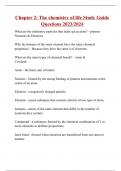
Chapter 2: The chemistry of life Study Guide Questions 2023/2024
Chapter 2: The chemistry of life Study Guide Questions 2023/2024 What are the subatomic particles that make up an atom? - protons Neutrons & Electrons Why do isotopes of the same element have the same chemical properties? - Because they have the same # of electrons What are the main types of chemical bonds? – ionic & Covalent Atom - the basic unit of matter Nucleus - formed by the strong binding of protons and neutrons at the center of an atom. Electron - a negatively charged...
- Package deal
- Exam (elaborations)
- • 8 pages •
Chapter 2: The chemistry of life Study Guide Questions 2023/2024 What are the subatomic particles that make up an atom? - protons Neutrons & Electrons Why do isotopes of the same element have the same chemical properties? - Because they have the same # of electrons What are the main types of chemical bonds? – ionic & Covalent Atom - the basic unit of matter Nucleus - formed by the strong binding of protons and neutrons at the center of an atom. Electron - a negatively charged...
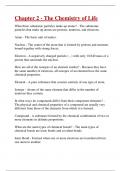
Chapter 2 - The Chemistry of Life(Anatomy)
Chapter 2 - The Chemistry of Life What three subatomic particles make up atoms? - The subatomic particles that make up atoms are protons, neutrons, and electrons. Atom - The basic unit of matter. Nucleus - The center of the atom that is formed by protons and neutrons bound together with strong forces. Electron - A negatively charged particle ( - ) with only 1/1840 mass of a proton that surrounds the nucleus. How are all of the isotopes of an element similar? - Because they have the ...
- Package deal
- Summary
- • 5 pages •
Chapter 2 - The Chemistry of Life What three subatomic particles make up atoms? - The subatomic particles that make up atoms are protons, neutrons, and electrons. Atom - The basic unit of matter. Nucleus - The center of the atom that is formed by protons and neutrons bound together with strong forces. Electron - A negatively charged particle ( - ) with only 1/1840 mass of a proton that surrounds the nucleus. How are all of the isotopes of an element similar? - Because they have the ...
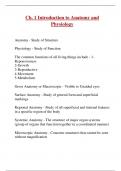
Ch. 1 Introduction to Anatomy and Physiology
Ch. 1 Introduction to Anatomy and Physiology Anatomy - Study of Structure Physiology - Study of Function The common functions of all living things include - 1-Reponsiveness 2-Growth 3-Reproductive 4-Movement 5-Metabolism Gross Anatomy or Macroscopic - Visible to Unaided eyes Surface Anatomy - Study of general form and superficial markings Regional Anatomy - Study of all superficial and internal features in a specific region of the body Systemic Anatomy - The structure of...
- Summary
- • 7 pages •
Ch. 1 Introduction to Anatomy and Physiology Anatomy - Study of Structure Physiology - Study of Function The common functions of all living things include - 1-Reponsiveness 2-Growth 3-Reproductive 4-Movement 5-Metabolism Gross Anatomy or Macroscopic - Visible to Unaided eyes Surface Anatomy - Study of general form and superficial markings Regional Anatomy - Study of all superficial and internal features in a specific region of the body Systemic Anatomy - The structure of...
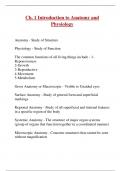
Ch. 1 Introduction to Anatomy and Physiology
Ch. 1 Introduction to Anatomy and Physiology Anatomy - Study of Structure Physiology - Study of Function The common functions of all living things include - 1-Reponsiveness 2-Growth 3-Reproductive 4-Movement 5-Metabolism Gross Anatomy or Macroscopic - Visible to Unaided eyes Surface Anatomy - Study of general form and superficial markings Regional Anatomy - Study of all superficial and internal features in a specific region of the body Systemic Anatomy - The structure of...
- Summary
- • 7 pages •
Ch. 1 Introduction to Anatomy and Physiology Anatomy - Study of Structure Physiology - Study of Function The common functions of all living things include - 1-Reponsiveness 2-Growth 3-Reproductive 4-Movement 5-Metabolism Gross Anatomy or Macroscopic - Visible to Unaided eyes Surface Anatomy - Study of general form and superficial markings Regional Anatomy - Study of all superficial and internal features in a specific region of the body Systemic Anatomy - The structure of...
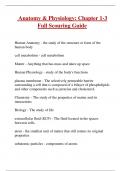
Ch. 1 Introduction to Anatomy and Physiology fully composed
Ch. 1 Introduction to Anatomy and Physiology Anatomy - Study of Structure Physiology - Study of Function The common functions of all living things include - 1-Reponsiveness 2-Growth 3-Reproductive 4-Movement 5-Metabolism Gross Anatomy or Macroscopic - Visible to Unaided eyes Surface Anatomy - Study of general form and superficial markings Regional Anatomy - Study of all superficial and internal features in a specific region of the body Systemic Anatomy - The structure of...
- Package deal
- Summary
- • 32 pages •
Ch. 1 Introduction to Anatomy and Physiology Anatomy - Study of Structure Physiology - Study of Function The common functions of all living things include - 1-Reponsiveness 2-Growth 3-Reproductive 4-Movement 5-Metabolism Gross Anatomy or Macroscopic - Visible to Unaided eyes Surface Anatomy - Study of general form and superficial markings Regional Anatomy - Study of all superficial and internal features in a specific region of the body Systemic Anatomy - The structure of...
